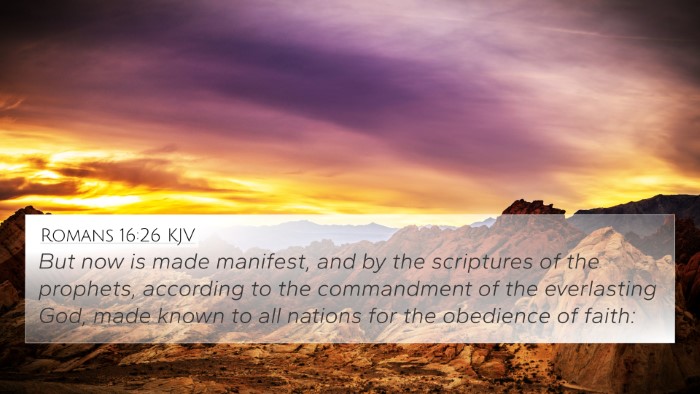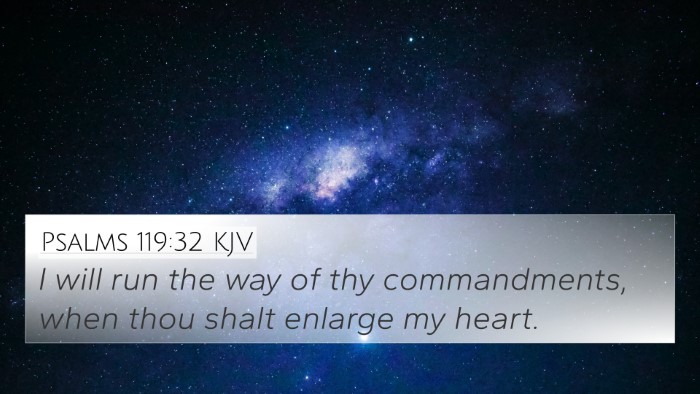Ezekiel 11:20 - Summary and Interpretation
Bible Verse: Ezekiel 11:20 - "And I will give them one heart, and I will put a new spirit within you; and I will take the stony heart out of their flesh, and will give them a heart of flesh."
Meaning and Insights from Commentaries
This verse from Ezekiel presents a profound promise of spiritual renewal and transformation. It emphasizes God's desire to unify His people and change their inner selves fundamentally so they can walk in His ways.
Overview of Key Themes
- Spiritual Transformation: This verse highlights the importance of a changed heart and spirit for faithful living.
- Unity: The mention of "one heart" signifies a collective unity among God's people.
- God's Initiative: The transformation is initiated by God, showing His grace and mercy in restoring His people.
Commentary Insights
According to Matthew Henry, this promise points towards the internal change needed for true obedience to God. A stony heart represents resistance to God, whereas a heart of flesh symbolizes sensitivity and receptiveness to His will.
Albert Barnes adds that this transformation is not merely external but deeply internal, suggesting that true worship can only arise from a heart that is alive and responsive to God’s commands.
Adam Clarke stresses the importance of the new spirit that God provides, which signifies a renewed purpose and desire for holiness. This new spirit empowers believers to engage in godly living, thus fulfilling the covenant relationship between God and His people.
Related Bible Cross-References
- Jeremiah 24:7: "And I will give them a heart to know me, that I am the Lord." - Enhances the theme of providing a knowledge-based transformation.
- 2 Corinthians 5:17: "Therefore, if anyone is in Christ, he is a new creation." - Illustrates the concept of newness that parallels with Ezekiel’s promise.
- Hebrews 8:10: "For this is the covenant that I will make with the house of Israel after those days, says the Lord: I will put my laws into their minds, and write them on their hearts." - Echoes the theme of internalization of God’s law.
- Romans 12:2: "Do not be conformed to this world, but be transformed by the renewal of your mind." - Similar emphasis on transformation.
- Acts 15:8: "And God, who knows the heart, bore witness to them, giving them the Holy Spirit just as he did to us." - Connects to the idea of God changing hearts.
- Psalm 51:10: "Create in me a clean heart, O God, and renew a right spirit within me." - A plea for internal renewal aligns with Ezekiel’s promise.
- Colossians 3:10: "And have put on the new self, which is being renewed in knowledge after the image of its creator." - Reinforces the idea of being made new in spirit.
- Ezekiel 36:26-27: "And I will give you a new heart and a new spirit I will put within you." - Complementary verse showing God’s promise of restoration.
Importance of Cross-Referencing Bible Verses
Cross-referencing Bible verses is an important tool for deeper understanding. It allows readers to explore thematic Bible verse connections and see how various scriptures interact and support each other.
Using a bible concordance or a bible cross-reference guide can greatly enhance your study, offering insights on how to find cross-references in the Bible. For example, exploring themes of transformation and new beginnings across both Testaments can provide a richer context for understanding the promise found in Ezekiel 11:20.
Methods for Effective Cross-Referencing
- Use a Bible reference resource to locate related verses.
- Engage in cross-reference bible study methods to draw connections between different books.
- Identify links between the Prophets and Apostolic teachings for a comprehensive view of biblical themes.
- Compare passages, like Isaiah 61:1-3 with Luke 4:18-19, for a deep dive into the impact of God’s spirit.
Conclusion
The transformation promised in Ezekiel 11:20 is not just a historical note but a living truth applicable to believers today. It invites us to consider how God can transform stony hearts into hearts of flesh, equipped to love and serve others.
This exploration of the verse, combined with comparative Bible verse analysis and thematic connections, deepens our understanding of God’s redemptive work throughout scripture and in our lives.























